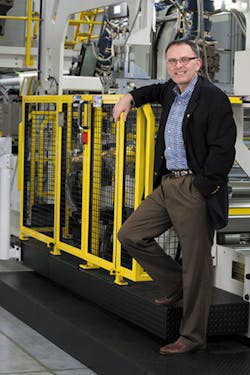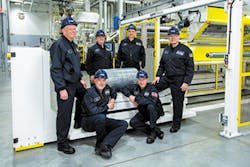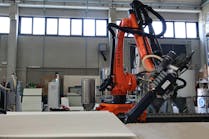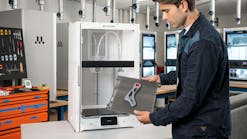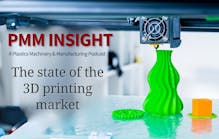When Dana Hanson founded Processing Technologies International (PTi) with Jon Roberts in 1988, he was only 28 years old — inspiring competitors to nickname his team "the kids from Chicago." The last 30 years have brought their share of challenges, but those "kids" have weathered them all to develop PTi into a global leader in high-performance sheet extrusion machinery, serving more than 20 countries. Hanson discussed his career with PMM correspondent Lisa Jo Lupo.
What brought you to the plastics industry and why did you establish PTi?
Hanson: How does anyone take a pathway in their career? It's by doors opening and making the decisions to go through them. I went to work in the '80s for a company — Crown — that built machinery for the plastics industry. It was at Crown that I met Jon Roberts and another gentleman who still works on our executive team, Tom Limbrunner. Jon and I coalesced in 1988 to start PTi; Mr. Limbrunner joined us in the early '90s. We started out in a broad field of extrusion that included a lot of market segments. Then we flourished and got a lot of traction in sheet. So, it's been an evolutionary process as our designs and innovation really started to become refined and gain traction in the marketplace.
What challenges did you experience as you grew the business? How did you overcome them?
Hanson: For any manufacturing business, there's the constant balance of resources involving people, capital and physical space. … There was the 2009 event, the largest economic downturn of our lifetime. Our personal experience in that situation was that we maintained profitability through the whole cycle. It's not the only economic cycle we've seen, but at that time, it was probably the fourth or fifth since our inception, and it's not the last. Every five to seven years there's a contraction; there's a this, there's a that. You have to be positioned with the strength of your company to withstand it. Kind of like a storm in a boat at sea.
To what do you attribute the company's success?
Hanson: Our competitors used to refer to us as the kids from Chicago — not necessarily respectfully. Now [Jon and I] are 58 years old; I don't consider myself a kid anymore. To PTi's strength, we've got a tremendous organization; to use a sports analogy, we've got a lot of depth on our bench. One thing that has contributed to our success in the past and recently is the longevity — the stick-to-it-iveness — that our employees have with us. We have long-tenured employees, so we don't experience a great deal of turnover at the level which I would consider to be the core group. Looking back, there has been a tremendous reallocation in the market — that includes some stalwart names of the industry no longer around. In our lifetimes, there have been a lot of changes that have all presented PTi with great opportunity.
PTi's success led to a $10 million expansion of your Aurora, Ill., headquarters in 2016. What did that include?
Hanson: We increased our facility size by 40,000 [square] feet; we were operating with a facility of 60,000 [square] feet, which gave us 100,000 [square] feet total. In that expansion, we dedicated 15,000 [square] feet to a Technology Development Center [TDC], which houses two production-scale test lines of a couple thousand pounds per hour that demonstrate some of our key technology. So, there's no scale-up; customers can come in and run sheet and take it back and feed it back into their thermoformer on a 1-for-1 scale. Each of the lines represented in the facility are multi-million-dollar lines. It's a tremendous, tremendous training and demonstration tool. In the technology center, we also have a materials-testing laboratory and a training facility for our customers. One of the unique headwinds that our customers are challenged with today is, there's no longer the mindset in the workforce of going to work for a company and retiring from that company. There aren't typically the 30- and 40-year employees; there's a tremendous turnover of production folk. We saw a great need; and the training aspect of our TDC is a tremendous tool for our customers, which they can take advantage of repeatedly throughout the year.
You have a number of patents to your credit. Why is innovation important?
Hanson: A company in the extrusion business, doing what we do, doesn't do it with one person. The opportunity to develop technology when you have a very talented group and live demonstration equipment — on which [to] operate and see opportunity within the different technical themes — is a great environment to cultivate new ideas and new designs. We see our intellectual property as a means of differentiation; we're very prolific and active in developing technology. We have a lot of standard products that we see as building blocks. We get tasked from time to time by customers who want us to develop a nuance or a new process that they're challenged with. So, we start from a foundation of: What building blocks do we have to draw from? We're challenged year in and year out to work with our customers to develop things that may or may not exist.
Is there an invention or innovation of which you are particularly proud, one that is especially beneficial?
Hanson: Our G-series roll stand represents a collection of four or five patented technical features. I look at that, and it really gives me a warm feeling inside because it is so far advanced in quality, features, functionality, precision, adaptability and design-build attributes — and that's feedback we get from our customers. We're challenged with going into facilities where they've never run sheet before, so we have to train operators; we have to have machinery that is adaptable in a culture that's trying to find their way. A customer told me that you have to have a control system that can be run by a grandmother with long fingernails. Those are some of the challenges of our customers, so they also precipitate the challenges we have as their supplier and partner. So, the G-series lineup of roll stands is something I still get excited about. We build some pretty big stuff. We go as high as 48-inch-diameter chrome rolls at 150 inches wide — that gets to be a big piece of equipment. The same on the extrusion complex; we build some pretty big systems, and multilayer co-extrusion is one of our strengths — that's where you have anywhere from three to six or seven extruders running in the same die head.
What has been your greatest contribution to the industry?
Hanson: As a company, I would say our greatest contribution is the integration that we extend to our customers with respect to our offer of products or services. PTi has been extremely successful in coming up with the big projects; when there's a big expansion or a multi-line project, we have a knack for being selected as the vendor of choice. These projects can span tens of millions of dollars. What that offers the customer is continuity, so they aren't comingling multiple brands of machines in a facility where they need constant and uniform sheet technology.
What will be your legacy?
Hanson: As an engineer, it's been a playground for me: building machinery. It's been very fun, and it continues to be so.
